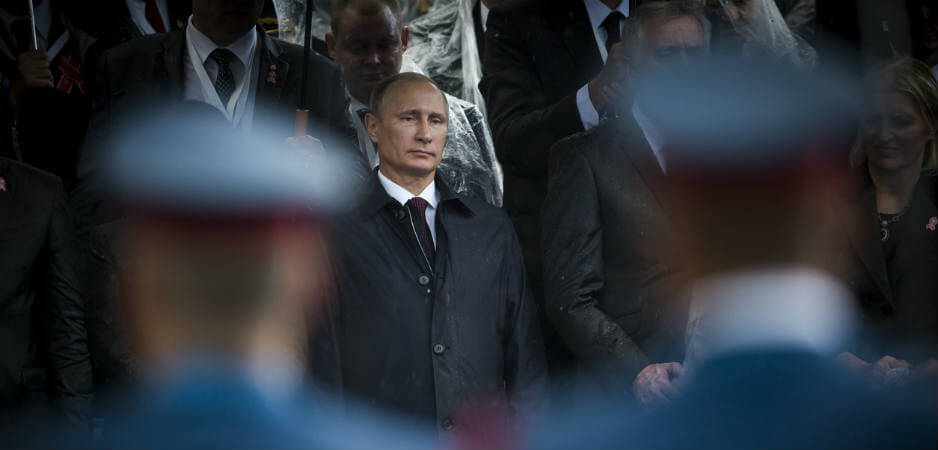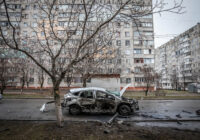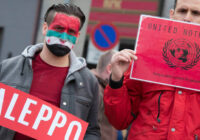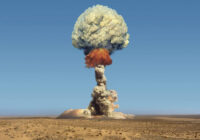Russia’s new foreign policy doctrine sees the return of military force.
In early December 2016, the Russian Federation published its new foreign policy doctrine. The previous update was in 2013, at the threshold of the Ukrainian crisis. Since then, it has been interesting to see how the Kremlin changes its view of the world and shapes its new foreign policy.
The most radical innovation is the new assumed choice of using military force when other diplomacy tools fail. As Vladimir Frolov wrote in a column on the new Russian foreign policy, “Russia is no longer gun-shy. It is gung-ho.” Andrei Bystritskiy, chairman of the board of the Valdai Club Foundation, noticed that the return of force in international relations is confirmed. He considers it as a more efficient way to counter Daesh (Islamic State) and international terrorism.
Since 2013, Russia has become increasingly confident about its ability to dominate the geopolitical agenda. In Syria, Ukraine or the Baltic, observers closely examine Russian decisions. The most important demonstration of power is in Syria, where Russians have definitively been playing a leading role since its involvement in the conflict. From the chemical weapons plan to the ending of the battle for Aleppo, President Vladimir Putin has made Russia an unavoidable part of the conflict—whether as a solution or as a problem.
Moreover, Putin asserts that Russia has a coherent and predictable foreign policy. The destruction of Daesh is an unlikely priority, but Russia shows its full support to its ally—the Syrian state—through the Assad regime. Russia looks more determined and able to defend its principles and interests than the West, which looks fickle and unpredictable.
France had bet on a quick collapse of the regime and has had to reconsider its position by providing grudging support to the rebels. America lost its credibility with its “red line” on the use of chemical weapons by Syrian President Bashar al-Assad’s forces, as notably explained by the incoming national security advisor, Michael Flynn.
Putin Rising
Putin’s authoritarian regime could be an advantage in the definition of foreign policy. With fewer, or altogether nonexistent, constraints of parliament, Putin is more reactive on geopolitical issues than the Western democracies—especially the United States where the president often faces a hostile Congress. Moreover, Putin does not really care about Russian public opinion, which in any case is largely favorable toward him and his actions.
This popularity is not only amongst Russians, but is seen as rising all over Europe. In France, many political figures like François Fillon (center-right presidential candidate and former prime minister), Marine Le Pen (leader of the far-right Front National) or Jean-Luc Mélenchon (far-left leader) have developed a profound respect for Putin. The people also view the Russian president with rising admiration, and Western audiences of Russian media like the government-sponsored RT (formerly Russia Today) is increasing. The recent widely-viewed video of a Canadian journalist criticizing Western media coverage of the Syrian war published by RT was evidence of that fact.
In an opinion column in the French daily Le Monde, the leader of the liberals in the European Parliament, Guy Verhofstadt, called for resistance against the hybrid war with Russia. He emphasized the new dimension of the Russian strategy, tackling Russia’s meddling in the US presidential election and Russian propaganda in the media and on social networks. In November 2016, a resolution was approved at the European Parliament to counter anti-European Union (EU) propaganda. The resolution tackled both Islamic groups and Russia, which has not been without critics in both substance and form.
As Julian Nocetti from the French Institute of International Relations (IFRI) noticed, Russia represents a double threat (informational and cyber) to the West, yet Europe is still more focused on the economic issues of the digital single market than its impact on diplomacy and strategy. It should be made a diplomatic priority with Russia, as it has fully grasped the potential for the use of informational and cyber tools in a context of a hybrid war.
The ideological war is an important component of Putin’s strategy, where media plays an essential role. The Russian president wants to break the supposed monopoly of the Western control of the international system, promoting a real multipolar world. The demise of the Soviet Union (USSR) in 1991 was the “major geopolitical disaster of the century” for the Kremlin, and it undermined the balance of power.
But Russia still wants to be an empire, perhaps not in a sense of returning to the structure of the USSR, but reclaiming its place as the heart of Eurasia in a multipolar world of regional universalism. This theory is especially promoted by Alexander Dugin, nicknamed Putin’s Rasputin by Western media, in his blog, The Fourth Political Theory—instead of liberalism, communism and fascism. The priority is the fight against Western values, which are considered as the embodiment of decline and decadence, and the release of Europeans from American ideology. This should result in the unification of Eurasia through political, cultural economic and social ways.
Dugin’s ideas are not falling on deaf ears. In its annual report, Russian Public Opinion 2013-2015, the Levada Center—an independent polling and sociological research organization based in Russia—showed how most Russians have negative opinions about the West. In February 2015, of the 1,600 respondents, 44% considered the West as “a different civilization, a strange world” and 25% viewed it as “states or political forces, which [will] always be hostile” to Russia. In September 2015, only 30% of the 800 respondents had a positive opinion of the “Western way of life” compared to 46% back in 2008.
But ultimately, how strong is Russia?
Questioning Russian Capability
According to French expert on international relations Pascal Boniface, Putin is part of the powerful leaders club, but he is not as influential as Chinese President Xi Jinping. Like Putin, Xi is very popular amongst his voters and has made “China great again” on the international scene. But Russia, contrary to China, cannot be considered a great power capable of competing with the US. Russia represents less than 10% of the American gross domestic product (GDP), and this economic weakness has consequences on its policies, both domestic and international.
A recent deal was concluded between Glencore—an Anglo-Swiss multinational commodity-trading and mining company—and a Qatari investment fund to buy an $11 billion stake in Rosneft, where Russia’s state is the largest shareholder. It could be interpreted as a sign of Russia’s business appeal despite sanctions. But it can also be seen as a consequence of sanctions and of the fall of oil prices, where Russia needs to sell the state’s “family jewels” to boost public finances.
Since the fall of Aleppo to the Assad regime, the Russian government has called for a political solution to the conflict. Russia cannot apply the same model used in Chechnya in Syria: first destroy, then rebuild. Aleppo is not Grozny. Russia and Iran do not have the financial capacity for the reconstruction of Syria. A political solution that involves the international community, or at least the neighboring countries, cannot be avoided to end the war and move toward peace and stability in the Middle East.
However, Russia military capability is still difficult to assess. Nobody really knows what the long-term strategy of Putin in Syria is and how Russia will manage the current withdrawal.
The Wild Cards
But after eight years of Barack Obama’s presidency, a new man is set to enter the White House. Donald Trump has a reputation as being pro-Russian, and the nomination of Exxon Mobil’s Rex Tillerson as secretary of state seems to be paving the way for engaging Russia. On January 11, during his first press conference since July 2016, the president-elect asserted that complicity with Putin is “an asset, not a liability” and that “Russia will have much greater respect for our country” now that Trump is leading it. However, the incoming US president’s foreign policy is unpredictable and may be full of surprises and changing positions.
In the old world, 2017 is a year of elections and it is difficult to imagine what France’s foreign policy after its presidential election will be, or indeed in Germany after the federal election. Britain, too, is still not giving many signs of what direction it is heading after Brexit.
Globally, this period of democratic transition is favorable to Putin because most great decisions in the West are postponed. Putin’s decision not to respond to Obama’s removal of Russian diplomats with reciprocal sanctions is just one example of his waiting out until the next administration and not pursuing what he has dismissed as “kitchen diplomacy.”
Russia is a colossus with feet of clay. But no head of state seems ready or strong-willed to challenge Putin right now. Europe has still no real common diplomacy, and the US has entered a phase of uncertainty. On the contrary, Russia is “smarter, stronger and more determined,” to quote Putin’s foreign policy advisor, Sergey Karaganov. And it is the first step of success in international diplomacy.
The views expressed in this article are the author’s own and do not necessarily reflect Fair Observer’s editorial policy.
Photo Credit: dicus63
Support Fair Observer
We rely on your support for our independence, diversity and quality.
For more than 10 years, Fair Observer has been free, fair and independent. No billionaire owns us, no advertisers control us. We are a reader-supported nonprofit. Unlike many other publications, we keep our content free for readers regardless of where they live or whether they can afford to pay. We have no paywalls and no ads.
In the post-truth era of fake news, echo chambers and filter bubbles, we publish a plurality of perspectives from around the world. Anyone can publish with us, but everyone goes through a rigorous editorial process. So, you get fact-checked, well-reasoned content instead of noise.
We publish 2,500+ voices from 90+ countries. We also conduct education and training programs
on subjects ranging from digital media and journalism to writing and critical thinking. This
doesn’t come cheap. Servers, editors, trainers and web developers cost
money.
Please consider supporting us on a regular basis as a recurring donor or a
sustaining member.
Will you support FO’s journalism?
We rely on your support for our independence, diversity and quality.







